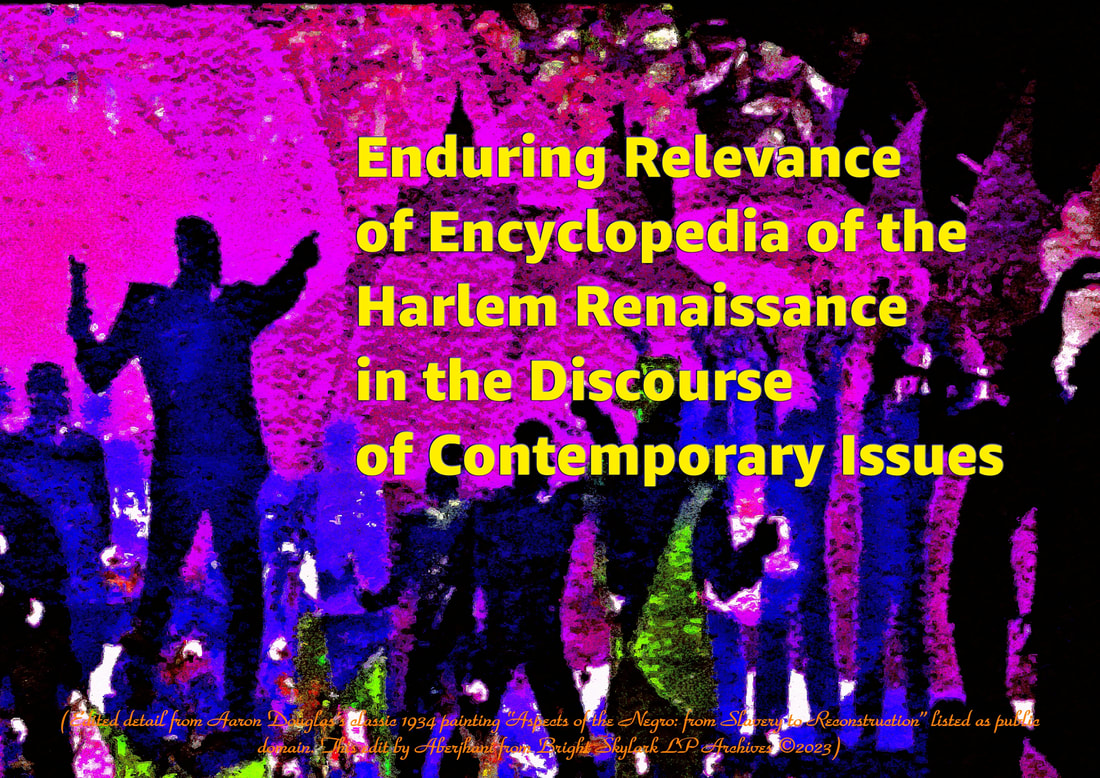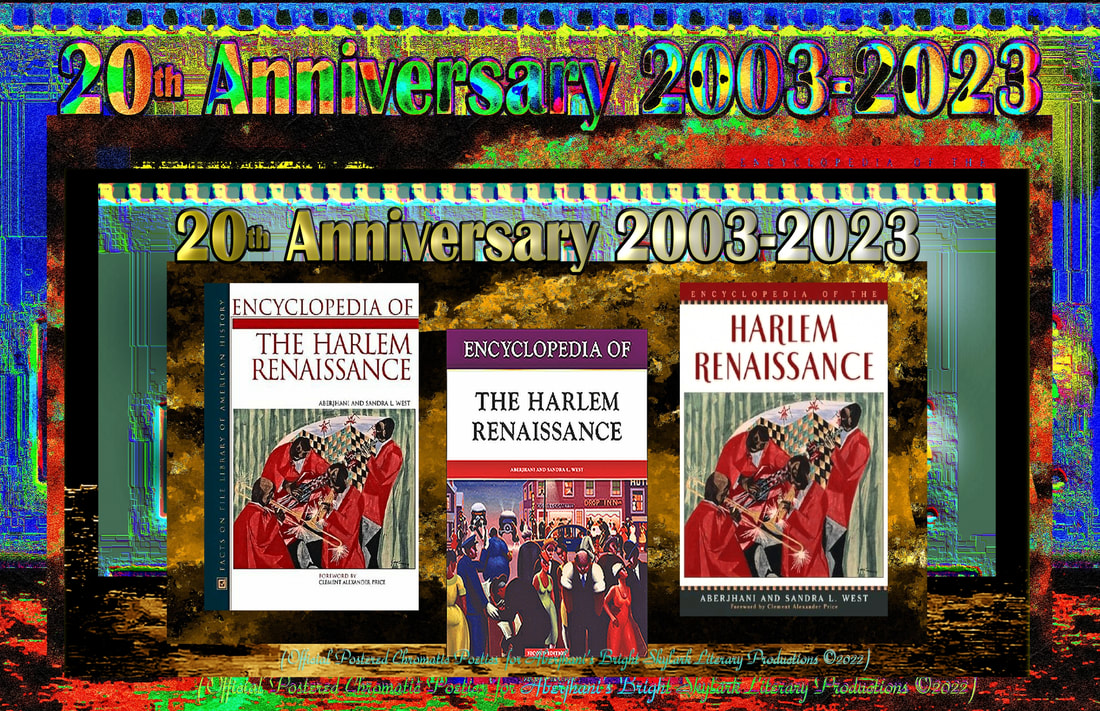Enduring Relevance of Encyclopedia of the Harlem Renaissance in the Discourse of Contemporary Issues8/25/2023 The early 20th century’s Harlem Renaissance stands as one of the most influential cultural and intellectual movements in American history. It was a vibrant period of artistic and literary expression that showcased the immense talent and creativity of African American artists, writers, musicians, and intellectuals. Although it was most impactful during the 1920s and 1930s, it laid the foundation for much of the subsequent discourse on race, identity, art, and societal transformation that continues today. In 2003, Aberjhani, in collaboration with his late co-author Sandra L. West and foreword author Dr. Clement Alexander Price, unveiled the Encyclopedia of the Harlem Renaissance. In addition, esteemed guest contributors the volume included: article authors Iris Formey-Dawson, Vaughnette Goode-Walker, Mary C. Lewis, and Karen E. Johnson, with an opening epigraph by Ja A. Jahannes. As we commemorate the encyclopedia’s 20th anniversary, it is essential to recognize the profound significance of this remarkable publication, which has become a treasured resource for scholars, educators, and reading enthusiasts alike. This comprehensive work has not only garnered prestigious awards and secured its place in esteemed library collections worldwide, but continues to offer invaluable insights into the enduring relevance of the Harlem Renaissance and its impact on contemporary issues. Through its meticulous compilation of articles, maps, indices, and insightful introductions from scholars and thinkers, the volume acts as reliable a bridge between the past and the present. Early Critical ReceptionOne of the key strengths of the Encyclopedia of the Harlem Renaissance is its ability to bridge the gap between academic scholarship and accessibility for a wide audience. The articles strike a balance between rigorous research and engaging prose, making it accessible to both scholars and general readers. This achievement is particularly commendable, as it allows the multi-faceted richness of the Harlem Renaissance to be appreciated by individuals from diverse backgrounds and educational levels. Upon its 2003 release, excellent book reviews for Encyclopedia of the Harlem Renaissance appeared in numerous publications ranging from: the Atlanta Daily World, one of America’s earliest Black newspapers, to Choice, described by West as “the finest library journal, bar none, in the country.” The title was listed as recommended reading by Essence Magazine, noted in The Trenton Times, featured as part of a cover story on Aberjhani for CONNECT Savannah weekly newspaper, and even mentioned in the CAAWC ( Carolina African American Writers Collective) newspaper in Raleigh, North Carolina, which is mailed to ports all over the world. Many more recommended the volume as well. The authors participated in signings and interviews across the country. In 2004, a member of Rutgers University’s Organization of Black Faculty and Staff interviewed Sandra L. West for its EBONY WATCH newsletter. When asked what sets this volume apart from other works on Harlem Renaissance figures at the time, West brilliantly underscored the diverse and holistic nature of the time and the book: “The Harlem Renaissance was not only a literary period or just a music period, though it sometimes appears that it is, based upon the strength of Langston Hughes' jazz poetry or the development of gospel and jazz music during that period. Aberjhani, the co-author, and I tried to approach the era from many more angles than are likely to be found elsewhere. “There are discussions in the book, for example, of multicultural and homosexual relationships during the Harlem Renaissance. There is a glossary of slang vocabulary, the distinctive language of Harlemese, which were culled from a ‘jive’ dictionary written by Cab Calloway, Zora Neale Hurston's folklore vocabulary, expressions from the community folk, and other oral history sources.” Moreover, its comprehensive coverage encompasses not only artistic endeavors but also fields like sports, journalism, education, and social impact. The encyclopedia's influence upon contemporary times, including its impact on global movements like Hip-Hop, and its role in helping shape the trajectory of how African-American history is taught or portrayed in popular media, to a degree echoes the far-reaching effect of the renaissance itself. Controversy over Diversity and Inclusivity As discussions about Critical Race Theory (CRT) and WOKE philosophy unfold in educational and political spheres across the United States, Encyclopedia of the Harlem Renaissance emerges as particularly relevant. The simple reason is because it serves as a testament to the importance of engaging with historical narratives to understand the complexities of race, identity, and society in America. West’s, Aberjhani’s, and their literary team's work reinforces the notion that grappling with the legacy of systemic racism, injustice, and the quest for equity is not a new concept but one that has spanned generations. The encyclopedia's presence in prestigious libraries and its endorsements from esteemed publications signal its academic credibility, making it a valuable resource for anyone seeking a nuanced understanding of these issues. In light of the debates surrounding the incorporation of CRT and WOKE ideology into educational curricula, the book's role as a foundational source of information and perspective should not be underestimated. While some political figures and educators have expressed opposition to these concepts, citing concerns about divisiveness and ideological bias, the encyclopedia stands as a proven example of how historical analysis can inform contemporary discourse without inciting division. It provides a platform for nuanced exploration and encourages critical thinking, essential qualities for fostering a society that values diversity and inclusivity. Parallel ChallengesFor his part, author-artist Aberjhani has frequently drawn parallels between the concerns and challenges of the Harlem Renaissance era and those of modern 21st-century times. Speaking with Angela Kinamore in an interview for African Voices Magazine, he shared the following: “…Racism is a reality today just as it was a reality back then. The question of the degree to which Blacks control their economic, political, social, and spiritual destinies around the world was relevant back then and is relevant now. The validity that society affords art and the value that society does or does not place upon the lives of creative artists working in any given medium was very much an issue during the renaissance and is very much an issue now." "Doubts and concerns regarding leadership," he continued, "were voiced back then and are concerns right now. I would therefore hope that Encyclopedia of the Harlem Renaissance encourages people to first of all confront whatever issues they are facing in their lives with honesty and then to establish some form of public dialogue, if needed, regarding the issue. I would hope this book would inspire them to establish creative solutions to the various challenges in their lives.” Aberjhani's aspiration that the book inspire creative solutions to contemporary challenges reflects the transformative power of knowledge and the importance of engaging with history to shape a better future. Just as the Harlem Renaissance paved the way for innovative thought and progressive movements, the encyclopedia serves as a touchstone for individuals and communities––like those engaged in BIPOC advocacy, environmental justice, or antiracism activism––seeking to effect positive change. In Conclusion Over the course of the past two decades, Encyclopedia of the Harlem Renaissance has transcended its function as a historical reference work. As we celebrate its 20th anniversary, we are reminded of its role as a beacon of knowledge, a catalyst for dialogue, and a testament to the enduring relevance of the Harlem Renaissance's themes. In an age when the digital realm reigns supreme, West’s, Aberjhani’s, and their team of contributor’s literary work stands as a reminder of the profound impact of print on cultural preservation and transformation. Just as the Harlem Renaissance paved the way for change, so too does this encyclopedia continue to spark conversations, inspire creative solutions, and ignite a passion for understanding the interconnectedness of our shared history. Chat 444 Feature Contributor Special to AI Literary Chat Salon 2023 for Bright Skylark Literary Productions
0 Comments
Your comment will be posted after it is approved.
Leave a Reply. |
Articles in AI Literary Chat Salon are written in partnership with chat bots to achieve a wide spectrum of balanced objective input and authentic human considerations. All feedback related to posts welcomed.Archives
June 2024
Categories
All
|


 RSS Feed
RSS Feed